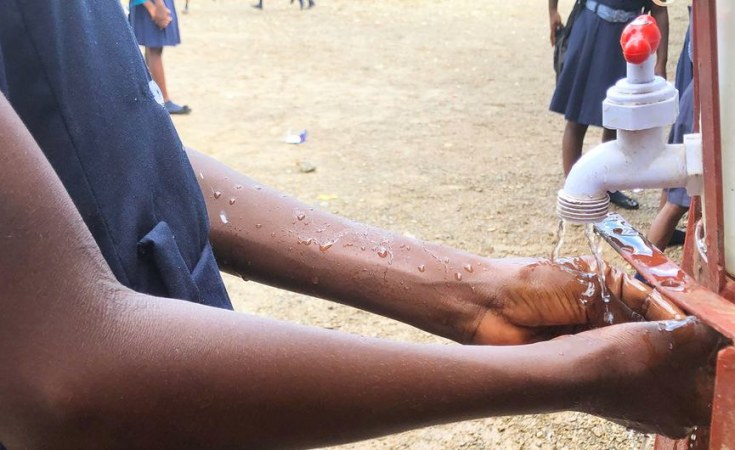In 2018, the Federal Government of Nigeria developed a 13-year strategy to address the WASH crisis in the country. Five years post-implementation, the strategy seems to be missing a key element -- climate change.
It is becoming increasingly difficult to predict water availability due to the ramifications of climate change globally. Extreme weather events and reshaping water cycles continue to jeopardise sustainable development and people's basic rights to clean drinking water and sanitation.
The World Health Organisation has identified climate change as the most significant threat facing humanity today, with negative impacts on water, sanitation, and hygiene (WASH) services. In Nigeria, a majority of households are already faced with limited access to good quality WASH services, with only 10% having access to basic WASH services and 23% lacking access to a basic water supply according to the 2021 WASHNORM report.
Climate change and WASH
In Nigeria, flooding is of major concern, with 34 of the country's 36 states having been affected. As of November 2022, the situation had caused a devastating impact on 3.2 million people, with 600 deaths and 1.4 million displaced.
The erratic rainfall patterns and rising sea levels make maintaining the already fragile WASH infrastructure in Nigeria increasingly challenging, particularly during periods of floods and drought. In addition to causing severe damage to homes, farms, and infrastructure, flooding can cause damage to water and sanitation facilities. It may also pollute water sources and harm sanitation systems, increasing the risk of waterborne and vector-borne illnesses.
Drought, on the other hand, reduces the availability of potable water for domestic use. When there is a significantly decreased availability of high-quality water in homes, as a result of climate crises, maintaining adequate sanitation and hygiene practices becomes difficult. This not only has immediate health consequences for families but also has far-reaching impacts on education and the economy.
A 13-year strategy
The declaration of a state of emergency for the WASH sector in 2018, under the leadership of former President Muhammadu Buhari, marked a significant milestone in efforts towards improving the WASH indices in the country. This was followed by the launch of the National Action Plan for the Revitalisation of WASH (NAPRW), a 13-year strategy that sought to address issues around governance, sustainability, financing, and monitoring and evaluation, with the support of Water Aid and other development partners.
The plan provided a roadmap towards addressing the WASH crisis faced by the country and ensuring universal access to sustainable and safely managed WASH services by 2030, in alignment with the Sustainable Development Goals (SDGs) 6.1 and 6.2 for water and sanitation.
Since its implementation in 2018, the different phases of the plan have been running concurrently and the plan is currently in the revitalisation phase. The plan considers issues such as governance, funding, sustainability and designates actions to federal and state government, however, the plan is missing a very crucial element- climate change.
Building climate resilient WASH systems
In 2013, Ethiopia launched the ONE WASH National Programme (OWNP) in response to the
climate crisis characterised by recurrent drought. This programme aimed to create WASH systems that not only withstand the impact of climate change, but also ensure safe and sustainable water access for communities and households. The programme utilised a multi-sectoral approach to building climate resilient WASH structures. Priority was given to diversification of water sources by incorporating groundwater wells and rainwater harvesting systems and capacity building of community members on best practices in affected areas. This proved beneficial to withstand the impacts of the recurring droughts because by relying on multiple sources, communities are less susceptible to failures in any single source during extreme weather events.
By the end of the first phase, of the programme in 2017, 18.7 million people gained access to water supplies through the construction of 38,336 different types of water supply schemes and 1,280 school WASH facilities were constructed under the OWNP-Consolidated WASH Account according to a UNICEF report.
Ethiopia's approach shows that climate-resilient policies are necessary on the path towards achieving the sustainable development goals. Nigeria can learn from not just Ethiopia's approach, but also from the wider global community. It is therefore better if we are prepared to withstand the negative impacts of climate change.
It is true that at the time of the launch of the NAPRW, the issue of global climate change was not as apparent as it is now -- 5 years post-implementation. However, it is becoming increasingly clear that sustainability of all facets of health and the economy would require building systems that adequately consider climate impacts. Therefore, adapting to this changing landscape calls for a review of the Action Plan to incorporate and institutionalise interventions aimed at strengthening the adaptability of all WASH-related interventions to the rapidly changing climate and improving WASH outcomes for communities. This is critical to achieving sustainability which is a key pillar of the plan.


